#opobo
Explore tagged Tumblr posts
Text
MP - 3D Assets (LO3) Part 2
Outfits


I haven't completed it yet but this the first outfit she wears after coming out of the fattening room. There is a breakable plate beside her (which isn't shown) but well-wishers come and drop money for her and congratulate her. This is when the women committee in Opobo come up to her and question her about things she learnt during the fattening room. If she answers correctly, she can go unto the next stage. The wrapper she is wearing is a Suu wrapper with coral beads. The headpiece was difficult to model so I'm leaving it to a later date.


The wrapper she wears at the start of the Egerebite ceremony is Ikaki. She has hearties wrapped across her chest and is wearing a coral crown (I managed to render it).


This is the fourth outfit for the day, it is the same outfit as the second (Ikaki wrapper)


This is the third outfit for the day, I made an error which needs to be changed. The wrapper she ties is Popo.


This is the first outfit of Sunday as she goes to church. She wears a damask wrapper and everything being gold. It was difficult to model the blouses so I represented them in the best way I could. The headtie is also left to another day due to it's difficulty.


This is the final outfit for the Egerebite ceremony, she is wearing a velvet wrapper.


This is the beginning of the Bibite ceremony. She wears a silk damask intorica wrapper.


The second outfit is an Intorica George wrapper with a blouse.


The Bibite ceremony ends with a plain George wrapper and blouse.
0 notes
Text
The Controversial Sale of Nigeria: Who Sold the Nation to the British for £865,000 in 1899?
In a pivotal moment of history, the late 19th century witnessed a transaction that would reshape the destiny of Nigeria.
#Brass Oil War#British imperialism#colonialism in Nigeria#Jaja of Opobo#Keywords for SEO Optimization: Nigeria history#King Koko Nembe#palm oil trade#Royal Niger Company sale
0 notes
Text
Opobo/Nkoro CTC Boss Appoints 53 Principal Officers, 10 SSA, and Over 600 SA
The Caretaker Committee Chairman (CTC) of Opobo/Nkoro Local Government Area (LGA), Rt. Hon. Enyiada Cookey-Gam, it said to have appointed 51 principal officers, 10 Senior Special Assistants (SSA), and over 600 Special Assistants (SA) to his cabinet. On July 9, Mr. Cookey-Gam, in a signed statement shared on social media, purportedly indicated that the appointment would commence with immediate…
0 notes
Text
Gallery Collection 001

Published: 2-21-2024 | Updated: N/A SUMMARY This is the first in a series of upcoming investment objects for Sims 2 – things your sims can use to generate income over time. From 1975-2000, Anheuser-Busch, Inc. commissioned 30 paintings of African kings and queens for an extended outreach and marketing campaign. This set of paintings features artwork from this amazing series. Celebrate Black History Month 2024! #co2bhm #bhm2024 #sims2bhm. *No copyright infringement intended – I own no rights to these images.
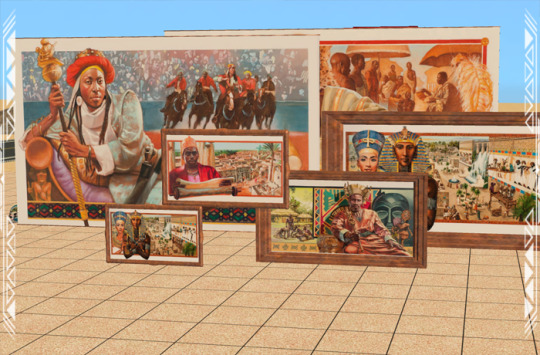
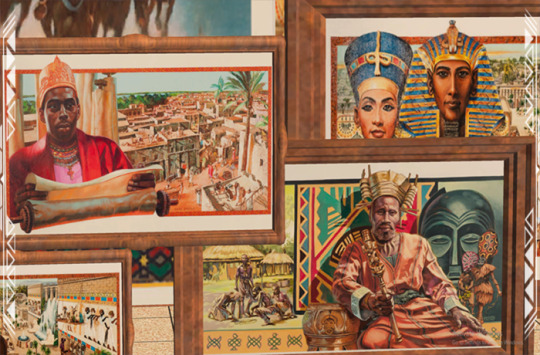
DETAILS Requires Sims 2. Requires Apartment Life for shiftability. §1K-15K | Buy > Deco > Wall Hangings Paintings are centered on 1-tile but cover more tiles than that. They come in various gallery sizes and images have been edited to fit the mesh. After purchase, their value increases by approximately 2% daily – watch out for burglars! Files with “MESH” in their name are REQUIRED. Frame recolors include EA/Maxis and yeti textures. Frame and painting recolors are merged into two files so you’ll have to take them or leave them. ITEMS Great Kings & Queens of Africa: Paintings 001-006 (92-764 poly) DOWNLOAD (choose one) from SFS | from MEGA
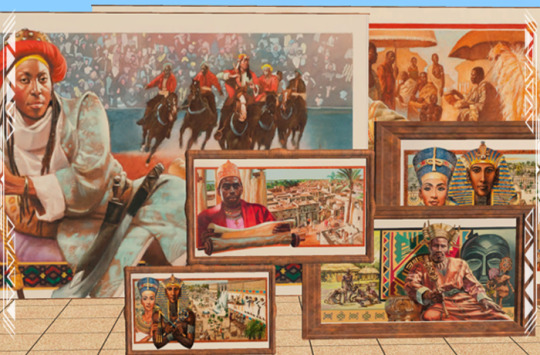
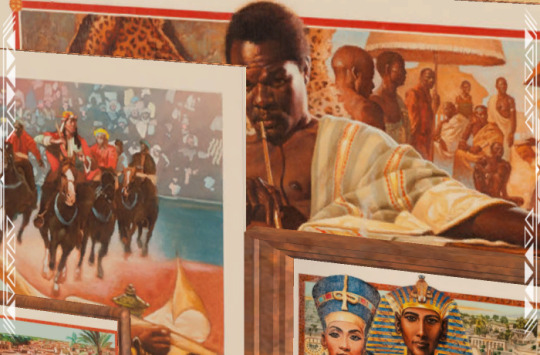
IMAGES
Akhenaton Pharaoh of Egypt (1375-1358 BC) by Barbara Higgins Bond
Alfonso I King of the Kongo (circa 1486-1543) by Carl Owens (1929-2002)
Askia Muhammaed Toure King of Songhay (1493-1529) by Leo Dillon
Benhanzin Hossu Bowelle—The King Shark (1841-1906) by Thomas Blackshear II
Cleopatra VII Queen of Egypt (69-30 BC) by Ann Marshall
Hannibal Ruler of Carthage (247-183 BC) by Charles Lilly
Hatshepsut The Ablest Queen of Far Antiquity (1503-1482 BC) by Dean Mitchell
Idris Alooma Sultan of Bornu (1580-1617) by Charles Lilly (1949-)
Ja Ja King of the Opobo (1821-1891) by Jonathan Knight
Khama III The Good King of Bechuanaland (1819-1923) by Carl Owens
Makeda Queen of Sheba (960 BC) by Debra Edgerton
Mansa Kankan Musa King of Mali (1306-1337) by Barbara Higgins Bond
Menelek II King of Kings of Abyssinia (1844-1913) by Dow Miller
Moshoeshoe King of Batsutoland (circa 1786-1870) by Jerry Pinkney
Mwana Ngana Ndumba Tembo—Ruler of the Angolan Tchokwe (1840-1880 circa) by Kenneth Calvert
Nandi Queen of Zululand (1778-1826 AD) by HM Rahsaan Fort II
Nefertari Nubian Queen of Egypt (192-1225 BC) by Steve Clay
Nehanda of Zimbabwe (1862-1898) by Lydia Thompson
Nzingha—Amazon Queen of Matambo (1582-1663) by Dorothy Carter
Osei Tutu King of Asante (circa 1650-1717) by Alfred Smith
Queen Amina of Zaria (1588-1589) by Floyd Cooper
Samory Toure The Black Napoleon of the Sudan (1830-1900) by Ezra Tucker
Shaka-King of the Zulus (1787-1828) by Paul Collins
Shamba Bolongongo African King of Peace (1600-1620) by Roy LaGrone
Sunni Ali Beer King of Songhay (circa 1442-1492) by Leo Dillon
Taharqa King of Nubia (710-664 BC) by John Thomas Biggers
Tenkamenin King of Ghana (1037-1075 AD) by Alexander Bostic
Thutmose III Pharaoh of Egypt (753-712 BC) by Antonio Wade
Tiye The Nubian Queen of Egypt (circa 1415-1340 BC) by Leonard Jenkins
Yaa Asantewa Queen of Ghana (1863-1923) by Barbara Higgins Bond CREDITS No copyright infringement intended – I own no rights to these images. Artwork and trademarks are the property of their respective creators and/or owners. If this exceeds fair use, please contact me via private message. Thanks: Simming and Sketchfab Communities. Sources: Any Color You Like (CuriousB, 2010), Beyno (Korn via BBFonts), Console Certificates (d_dgjdhh, 2019; 2011), EA/Maxis, Gyeongbokgung Sajeongjeon Painting (National Heritage Administration, 2024 via CCA; Sketchfab), Great Kings and Queens of Africa Series (Anheuser-Busch, Inc., 1975-2000; Kentake, 2016), Offuturistic Infographic (Freepik), Painting by Zdzislaw Beksinski (Sosnowski, 2018 via CCA), Yeti Metals (Shastakiss, 2017).
88 notes
·
View notes
Text
Opobo is a historical town in Rivers State, Nigeria, filled with rich culture, heritage, and a fascinating story. Founded in 1870 by the legendary King Jaja of Opobo, it emerged as a major trading hub during the era of the Atlantic slave trade and later became a center for palm oil trade.
King Jaja’s vision turned Opobo into a powerful city-state, controlling trade routes and flourishing as a maritime and economic force.
However in this modern age the people have suffered stagnancy for a long time due to the swampiness of their area and the absence of a good road network to ensure movement within and outside the region. However, times have changed, and development has come to the kingdom. The Opobo Ring Road project is part of the road infrastructural projects simultaneously going on in the state. The road project is a sign of rapid development, economic growth, and connectivity between other regions of the state and inversely to other states. The sand filling/land reform of 20 hectares of land was the first sign of this development. The aim is to eradicate the problem caused by the swampy nature of the area which negatively affects construction and connectivity. The project which extends more than 3km is a single carriageway with 3 bridge crossings, connecting it with other communities. The Opobo Ring Road project is set to improve transportation within the area. Movement of goods and people would no longer be a nightmare as there’ll be easy flexibility and it will save enough time for other businesses. This will ensure that people can migrate within and outside the state without experiencing the congestion of major areas in the city. Also, this will bring the unification and interaction of people within and outside the state through tourism, commerce, and industry toward economic prosperity.
opobo #riversstate #kingjaja #tourism #history #nigeria #acient
4h
24 notes
·
View notes
Text
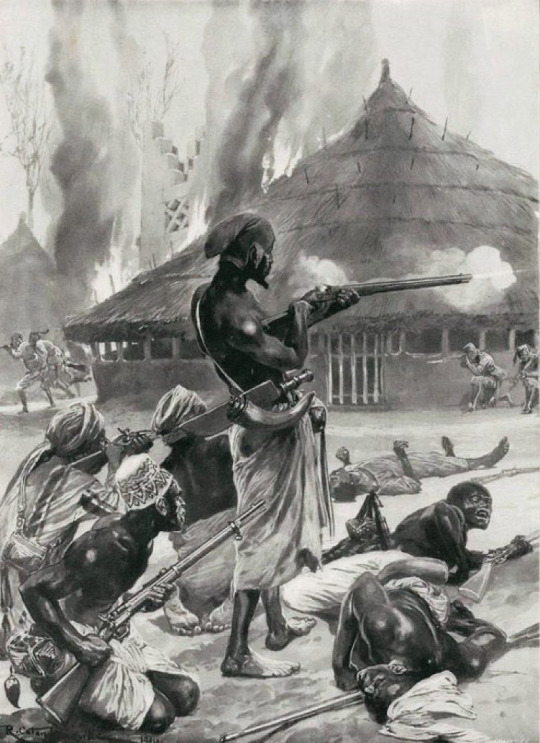
Aro Confederacy
The Aro Confederacy (1690–1902) was a political union orchestrated by the Aro people, Igbo subgroup, centered in Arochukwu in present-day southeastern Nigeria. The Aro Confederacy kingdom was founded after the beginning of the Aro-Ibibio Wars. Their influence and presence was all over Eastern Nigeria, lower Middle Belt, and parts of present-day Cameroon and Equatorial Guinea during the 18th and 19th centuries. The Arochukwu Kingdom was an economic, political, and an oracular center as it was home of the Ibini Ukpabi oracle, High Priests, the Aro King Eze Aro, and central council (Okpankpo). The Aro Confederacy was a powerful and influential political and economic alliance of various Igbo-speaking communities in southeastern Nigeria. It emerged during the 17th century and played a significant role in the region until the late 19th century.
The exact origins of the Aro Confederacy are not precisely documented, but it is believed to have been established around the mid-17th century. The Aro people, who were part of the Igbo ethnic group, inhabited the region around present-day Arochukwu in Abia State, Nigeria. They were skilled traders and missionaries who played a pivotal role in connecting various Igbo communities. This migration and their military power, and wars with neighboring kingdoms like supported by their alliances with several related neighboring Igbo and eastern Cross River militarized states (particularly Ohafia, Edda, Abam, Abiriba, Afikpo, Ekoi, Bahumono, Amasiri etc.), quickly established the Aro Confederacy as a regional economic power. The Aro Confederacy's strength came from its well-organized network of Aro agents who were dispersed across different communities in the region. These agents acted as intermediaries in trade, diplomacy, and religious matters. They facilitated commerce, resolved disputes, and spread the worship of the Aro deity known as the "Long Juju" oracle."The Opening Up of Nigeria, the Expedition Against the Aros by Richard Caton Woodville II" 1901
The "Long Juju" oracle was the spiritual centerpiece of the Aro Confederacy. It was housed in Arochukwu and considered a potent source of political authority and religious guidance. The Aro people used the oracle to enforce their influence and control over surrounding communities. It also served as a means to administer justice and settle disputes, often attracting pilgrims seeking solutions to their problems.
The Aro Confederacy gained significant economic power through trade and commerce Their economy was primarily based on agriculture, with the cultivation of crops like palm oil, yams, and cassava. They were also involved in trade with neighboring communities and European merchants. They controlled trade routes that passed through their territories, collecting tolls and taxes from traders. The Aro also engaged in the Trans-Atlantic slave trade by capturing and selling slaves to European traders.
Aro activities on the coast helped the growth of city-states in the Niger Delta, and these city states became important centres for the export of palm oil and slaves. Such city-states included Opobo, Bonny, Nembe, Calabar, as well as other slave trading city-states controlled by the Ijaw, Efik, and Igbo. The Aros formed a strong trading network, colonies, and incorporated hundreds of communities that formed into powerful kingdoms. The Ajalli, Arondizuogu, Ndikelionwu, and Igbene Kingdoms were some of the most powerful Aro states in the Confederacy after Arochukwu. Some were founded and named after commanders and chiefs like Izuogu Mgbokpo and Iheme who led Aro/Abam forces to conquer Ikpa Ora and founded Arondizuogu. Later Aro commanders such as Okoro Idozuka (also of Arondizuogu) expanded the state's borders through warfare at the start of the 19th century. Aro migrations also played a large role in the expansion of Ozizza, Afikpo, Amasiri, Izombe, and many other city-states. For example, Aro soldiers founded at least three villages in Ozizza. The Aro Confederacy's power, however, derived mostly from its economic and religious position. With European colonists on their way at the end of the 19th century, things changed.Burning of Arochukwu 1901
During the 1890s, the Royal Niger Company of Britain bore friction with the Aros because of their economic dominance. The Aro resisted British penetration in the hinterland because their economic and religious influence was being threatened. The Aro and their allies launched offensives against British allies in Igboland and Ibibioland. After failed negotiations, the British attempted to conquer the Aro Confederacy in 1899. By 1901, the tensions were especially intensified when British prepared for the Aro Expedition. The invasion of Obegu (in Igboland) was the last major Aro offensive before the start of the Anglo-Aro War. In November 1901, the British launched the Aro Expedition and after strong Aro resistance, Arochukwu was captured on December 28, 1901. By early 1902, the war was over, and the Aro Confederacy collapsed. Contrary to the belief that the Ibini Ukpabi was destroyed, the shrine still exists, and is intact in Arochukwu and serves mainly as a tourist site.

#african#afrakan#kemetic dreams#africans#afrakans#brown skin#brownskin#african culture#afrakan spirituality#arochukwu#anglo aro war#obegu#igboland#ibibioland#igbo#igbo culture#british#long juju#aro confederacy#confederacy#nigerian#cameroon
29 notes
·
View notes
Text
ITZY “GOLD” Cheer Guide
youtu.be/1TWhd-OPObo


3 notes
·
View notes
Text
Pinqmilz: Rising Star from Opobo Kingdom Ready to Inspire with ‘Hard Times Don’t Last
Tamunoimiebam Gift Cookey, popularly known as Pinqmilz, is an emerging force in the Nigerian music industry. Hailing from the ancient Opobo Kingdom, Pinqmilz’s passion for music began at just 13 years old. With a natural ability to create music without writing it down, he attributes his gift to his father, who was also a musician. Growing up in a musically inclined household, Pinqmilz found…
0 notes
Text
Wike Fires Back at Fubara Over "Red Biro" Comment
Wike Fires Back at Fubara Over "Red Biro" Comment
The Minister of the Federal Capital Territory, FCT, Nyesom Wike, has dismissed the threats by Governor Sim Fubara of Rivers State to continue using his “red biro” against his enemies. Wike reminded Fubara that he has been using the same red biro for 14 years and is still using it. Speaking at the crossover into the 2025 church service held at St. Paul’s Anglican Church, Opobo Town in Opobo/Nkoro…
0 notes
Text
In 2025, God'll Crush Rivers Enemies - Gov Fubara
Rivers State Governor, Sir Siminalayi Fubara, has expressed solid faith in the omnipotence of God to crush self-styled enemies of the State and its people. Governor Fubara spoke at the crossover into 2025 church service held at St. Paul’s Anglican Church, Opobo Town in Opobo/Nkoro Local Government Area in the early moments of January 1. He raised a gallantry song, with the brethren picking up…
0 notes
Text
Stop Playing Nwaotam in Igbo Language, Lily Gang, Ejesilem, Others Should Perform in Ibani – Amadabo
Our conversation with the Amadabo of Ishileogono, Soimi Kaladappa, started earlier with his reply to his critics wherein he asserted that he requires no authorization to bear his title: Amadabo (Ibani Language for Community Head) or conduct his official duties in his native language. In that interview, he also asserted the need to entrench the rendering of titles in Bonny and Opobo Kingdoms in…
0 notes
Text
The latest political news in Nigeria now is that, several loyalists of Governor Siminalayi Fubara have emerged as candidates for chairmanship positions under the Action People’s Party (APP) for the upcoming local government elections in Rivers State, set for October 5. These candidates, who were appointed just three months ago as caretaker committee chairmen by the governor, are now making their bids for official positions. Read Also: UNICEF Harps On Immunisation Of Children Against Life-Threatening Diseases, Infections This announcement comes at a time when the Peoples Democratic Party (PDP), of which Governor Fubara is a member, is grappling with an ongoing internal crisis. The caretaker committee chairmen declaring their candidacies include Chijioke Ihunwo from Obio/Akpor, Ezebunwo Ichemati from Port Harcourt, Brain Gokpa from Eleme, David Omereji from Emohua, John Ngubo-Otamiri from Etche, Promise Reginald from Omuma, and Mathew Dike from Tai. Notable among the new candidates are Enyiada Cookey-Gam, the former council chairman for Opobo/Nkoro, and Anengi Barasua Claude-Wilcox, the ex-chairman of Bonny Local Government Area. Both individuals previously opposed a controversial six-month tenure extension during the last administration and are now joining the APP. The upcoming local elections will also see other prominent figures representing the APP. Igwe Access, a former National President of the National Union of Petroleum and Natural Gas Workers (NUPENG), will contest for Okrika Local Government Area. Additionally, Isaac Umejuru, the current Commissioner for Urban Development, is set to run for Ogba-Egbema-Ndoni, while Ms. Tonye Oniyide-Briggs, a former Commissioner for Culture and Tourism, will contest for Akuku-Toru. The APP will also field Dr. Harry Agiriye, a Permanent Secretary in the State Civil Service. As the political landscape shifts, eighteen political parties are reportedly fielding candidates for these elections. This includes a faction of the All Progressives Congress (APC) led by Mr. Emeka Beke, who was recently confirmed by a court as the legitimate chairman of the party. Notably, the PDP, which has held a dominant position in local government elections in Rivers State since 1999, has chosen to abstain from the upcoming polls, adding another layer of intrigue to the electoral landscape.
0 notes
Text
Navy Rescues 59 Persons From Drowning In Rivers, Loses Officer
Operatives of the Forward Operations Base (FOB), Bonny in Rivers State have successfully rescued 59 individuals from a stranded dredging vessel at the mouth of the Opobo River. According to a statement by the Nigerian Navy’s spokesman, Aiwuyor Aliu-Adams, the base received a distress call about a dredging vessel in danger of going down at the mouth of the river which is typically turbulent at…
0 notes
Text
Umahi to Peter Obi: You don’t speak for Igbo, as South-east residents shun protest, open markets

….Enugu, Abia, Imo residents stay indoors …Businesses shut in Ebonyi All markets, stores and artisans’ shops in Nnewi, the industrial town of Anambra and Onitsha, the commercial city of Anambra State, opened for business as traders and youths shunned the #EndBadGovernance nationwide protest that started yesterday across the country. As usual, as early as 6:30 am, commercial buses and tricycle movements were noticeable on the roads and streets in Nnewi and Onitsha, conveying traders and artisans to their respective markets, stores and shops in the towns. Ndigbo had severally made their opposition known on the planned protests or 10 days of rage that started yesterday.Anambra State markets’ leaderships have assured that none of the markets would be shut down during the #EndBadGovernance protest ongoing across the country. There was normalcy in Onitsha and Nnewi, both commercial hubs of the state and other environs with filling stations and banks opened and transporters hustling for their daily bread. To douse the tension already generated by the protest, particularly among the traders and customers, Innocent Ezeoha, Chairman of Onitsha Main Market said the Igbo are not part of it. “You can see that the shops are open for business and traders and customers going about peacefully. “There is normalcy here. We are not part of the protest. We are already suffering hardship and staying at home doing nothing and pouring out on the streets to protest will not be the best option.“ We want government at all levels to do the needful. They should also help traders by ensuring a conducive environment for business to thrive in the country.” James Oraka, a trader at Nkwo Nnewi Market said protests have never solved social problems in the country, adding: “We, the Igbo don’t want to be part of the protest because other tribes will say we engineered it at the end. We are learning from history.” At the filling stations visited, the fuel pump attendants were busy dispensing the product to prospective customers. Other business activities are moving with security operatives doing their normal duties and no harassment of people. One Igbo vocal group that made their opposition categorically clear on the protest is the United Igbo Elders Council, UNIEC, Worldwide, and their stand, according to a statement they issued, yesterday is “based essentially on the differential attitude to human rights that the organisers have shown towards the Igbo/East in particular, and other Nigerians as well.” UNIEC, in the statement signed by its Director, Media and Publicity, Prof. Obasi lgwe, and its Coordinator General, His Lordship Alpha Justice, said: “The loud silence, signalling acquiescence of some of its organisers to the extremely targeted injustices against the Igbo/East and for the last nine years, orchestrated killings with countless evidences of official involvement or connivance with no sympathy from anywhere, baffles the imagination. ”UNIEC’s statement entitled, Rage or Protest in Nigeria: Position of the United Igbo Elders Council, UNIEC, Worldwide, rather made a 10-point demand on Mr President to stabilise Nigeria instead of supporting the protest. Some of the demands included the immediate lifting of the economic and ports blockade against the Igbo/East, imposed since 1967 and subsisting till today, by which Port Harcourt, Bonny, Opobo, and other Eastern ports were rendered inutile, except for oil purposes, compelling the Igbo to divert en masse to Lagos to conduct their maritime businesses. You don’t speak for Igbo, Umahi tells Peter Obi Meantime, Minister of Works, David Umahi, has lambasted Peter Obi, the presidential candidate of the Labour Party in 2023 election, saying he is not the mouthpiece for the Igbo. Umahi added that Obi should refrain from allegedly inciting the youths of the South-East against the administration of President Bola Tinubu ahead of the planned August 1 protest. Umahi spoke, Wednesday, during the Ebonyi State Youth and Stakeholders Summit at the Christian Ecumenical Centre in Abakaliki. “Let me make this clear: Mr. Peter Obi does not speak for Ndigbo. Our governors, Ohanaeze Ndigbo and our traditional rulers are our leaders; they speak for us. Let the enemies of Ndigbo hear this loud and clear: our governors and Ohanaeze Ndigbo are the mouthpieces of Ndigbo. Read the full article
0 notes
Text
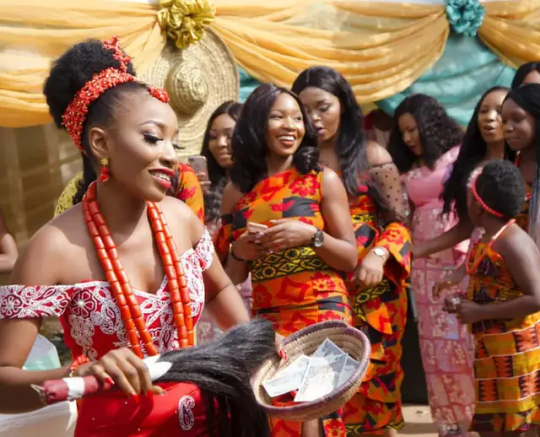
HISTORICAL IGBO TIMELINES:
STONE AGE -MIDDLE AGES.
This is the period dating 1.2million years to 3000BC , the era of homo-erectus found within the areas of ugwuele uturu following the discovery of Archeolean hand axes and stone tools in caves. Clay pots dating 3000BC were recovered at Afikpo and Opi iron slags .Details of this era is buried in archeology .
EARLY HISTORY:
8th-9 th AD : Kingdom of Nri begins with Eze Nri Ìfikuánim.
1434 AD: Portuguese explorers make contact with the Igbo.
1630 AD : The Aro-Ibibio Wars start.
1690AD: The Aro Confederacy is established
1745AD : Olaudah Equiano is born in Essaka, but later kidnapped and shipped to Barbados and sold as a slave in 1765.
1797AD : Olaudah Equiano dies in England as a freed slave.
1807 AD : The Slave Trade Act 1807 is passed (on 25 March) helping in stopping the transportation of enslaved Africans, including Igbo people, to the Americas. Atlantic slave trade exports an estimated total of 1.4 million Igbo people across the Middle Passage
1830 AD : European explorers explore the course of the Lower Niger and meet the Northern Igbo.
1835 AD: Africanus Horton is born to Igbo ex-slaves in Sierra Leone
1855 AD: William Balfour Baikie a Scottish naval physician, reaches Niger Igboland.
MODERN HISTORY:
1880–1905: Southern Nigeria is conquered by the British, including Igboland.
1885–1906: Christian missionary presence in Igboland.
1891: King Ja Ja of Opobo dies in exile, but his corpse is brought back to Nigeria for burial.
1896–1906: Around 6,000 Igbo children attend mission schools.
1901–1902: The Aro Confederacy declines after the Anglo-Aro war.
1902: The Aro-Ibibio Wars end.
1906: Igboland becomes part of Southern Nigeria (the beginning of our problem)
1914: Northern Nigeria and Southern Nigeria are amalgamated to form Nigeria. (escalation of our problem)
1929: Igbo Women's War (first Nigerian feminist movement) of 1929 in Aba.
1953: November Anti Igbo riots (killing over 50 Igbos in Kano) of 1953 in Kano
1960: October 1 Nigeria gains independence from Britain; Tafawa Balewa becomes Prime Minister, and Nnamdi Azikiwe becomes President.
1966: January 16 A coup by junior military officers takes over government and assassinated some country leaders. The Federal Military Government is formed, with General Johnson Aguiyi-Ironsi as the Head of State and Supreme Commander of the Federal Republic.
1966: July 29 A counter-coup by military officers of northern extraction, deposes the Federal Military Government; General Johnson Aguiyi-Ironsi is assassinated along with Adekunle Fajuyi, Military Governor of Western Region. General Yakubu Gowon becomes Head of State.
1967: Ethnoreligious violence between Igbo Christians, and Hausa/Fulani Muslims in Eastern and Northern Nigeria, triggers a migration of the Igbo back to the East.
1967: May 30 General Emeka Ojukwu, Military Governor of Eastern Nigeria, declares his province an independent republic called Biafra, and the Nigerian Civil War or Nigerian-Biafran War ensues.
1970: January 8 General Emeka Ojukwu flees into exile; His deputy Philip Effiong becomes acting President of Biafra.
1970: January 15 Acting President of Biafra Philip Effiong surrenders to Nigerian forces through future President of Nigeria, Olusegun Obasanjo, and Biafra is reintegrated into Nigeria.
References:
Understanding 'Things Fall Apart' by Kalu Ogbaa
Wikipedia
Image Credit: Ukpuru, Pinterest
#kalu#ogbaa#nigerian#ojukwu#emeka#biafra#fulani#hausa#igbos#igbo#nigerian history#igbo history#essaka#africanus horton#african#afrakan#kemetic dreams#africans#afrakans#brownskin#brown skin#african culture
12 notes
·
View notes
Text
To-do List (LO3)
Interactions for web portfolio
3D modelling
References
Go through research
Start UX for Opobo
Create final 3D models
0 notes